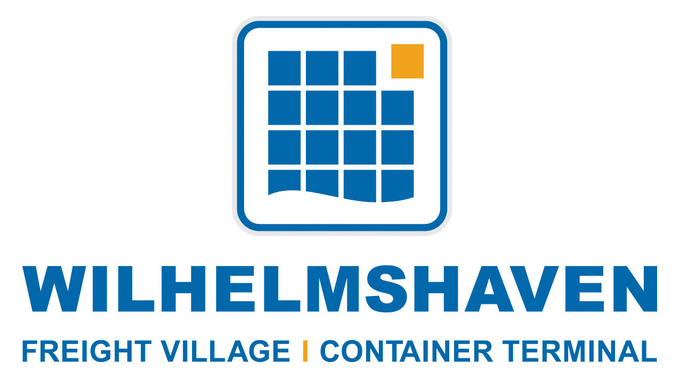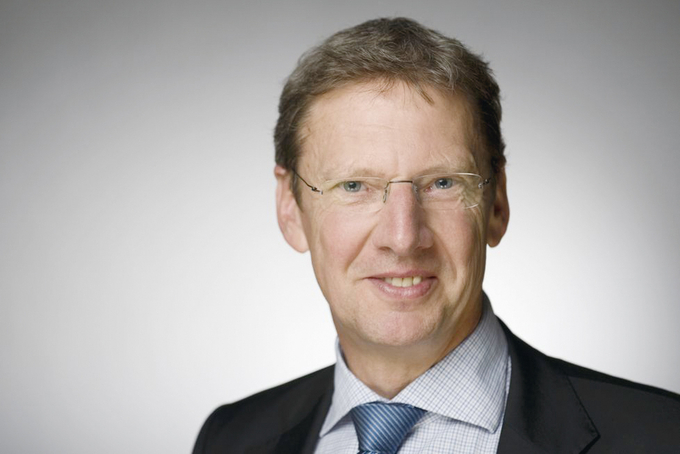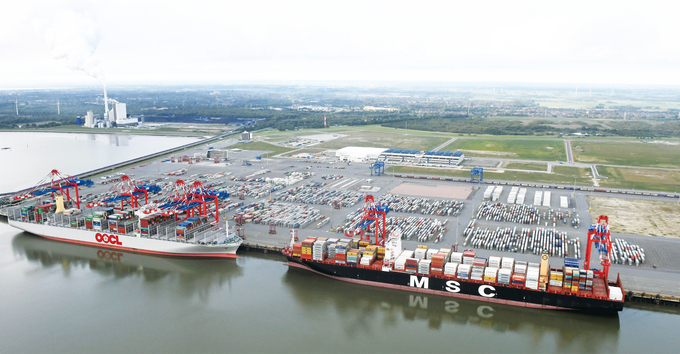
Interview with the Nordwest-Zeitung conducted with Andreas Bullwinkel, Managing Director of Container Terminal Wilhelmshaven JadeWeserPort-Marketing GmbH & Co. KG, published on 29. 3. 2018

Q. Mr. Bullwinkel, why should a logistics business choose the Container Terminal Wilhelmshaven instead of say the port of Hamburg?
A. Wilhelmshaven has several advantages: on the nautical side, it boasts very short channel navigation times, which brings significant time and cost savings potential for shipping companies. This also makes timetables much more reliable. On the land side, it is possible to locate a company here directly alongside the port. A warehouse for instance, can be built around 800 metres from the pier, to therefore benefit from the very short journey times. In addition, the port also has excellent hinterland connections. In comparison to other ports, the routes in and out of the port are actually always available. In other places, they have to be booked a long time in advance. If something unforeseen happens, it can take up to several weeks at these ports before a space is available again.
Q. How can Wilhelmshaven improve?
A. One of the things we would like to prioritise is the railway connection, but we are only the co-pilots here unfortunately. The railway connection is twin-track, and therefore has all of the capacities that the port needs, also for other aspects which do not involve container traffic. The criticism we have is that the electrification is still not ready, and is directed at DB Netz and the government. However, to be fair, it is necessary to point out that this is not so much a problem of a lack of money or political will, but rather due to the lawsuits arising from the city of Oldenburg.
Q. What do you say about the criticism directed at the railway?
A. The objective of the plaintiffs is clearly to delay the electrification. This costs a lot of money, but will not actually change anything at the end of the day. The railway line will stay there, and it will also be electrified. The few people trying to fight this would prefer not to have a railway line at all. But does that make any sense? Rail is the mass transport medium for freight traffic. This is actually the most economical and environmental way of doing things, and we would like it to be even more environmentally friendly by having the railway line electrified. The alternative would be to transport the freight by truck, but again, nobody is in favour of that either. Some of the people in Oldenburg should seriously ask themselves whether there is any benefit in what they are doing. They are demanding a railway bypass, but in accordance with the slogan: not in my backyard. Put it somewhere else and then it's ok. And concerning the aspect that people living along the railway line get upset that trains run on the tracks, I say this: the railway was almost certainly already there when you bought your house or your flat. The lawsuits will now be dealt with.
Q. How are you positioned in terms of infrastructure?
A. The connections to the port are unique. I maintain that Wilhelmshaven is the container port with the best connections to the hinterland anywhere in Europe, and I have never heard anything to the contrary so far from the competitor ports. If I look for instance at Antwerp and Rotterdam, and consider the distances that have to be tackled, the long road journeys from the motorways out of the cities until the trucks reach the terminals, then I can only say: poor them. We are positioned exceptionally well in terms of infrastructure, and everything can be reached very quickly.
Q. How is the Freight Village Wilhelmshaven actually organised: for example with respect to VW – who sells the plots of land to whom here?
A. We don't actually sell any land in the vicinity of the port: the plots are acquired with a leasehold, as in the recent case of VW. And VW does not do this itself, but via an investor: in this case, Panattoni. In principle, this company builds the warehouse on behalf of Volkswagen according to their specifications. And Panattoni is our contractual partner for the leasehold contract. Volkswagen monitors and supervises the whole transaction, but in contractual terms, Panattoni is our sole partner; whilst Panattoni itself has a contractual relationship with Volkswagen with respect to the warehouse which is being built there. Later on, Volkswagen will then issue a tender for a logistics company which handles the intralogistics for Volkswagen in the warehouse.
Q. What is a leasehold?
A. A leasehold is basically a sale for a limited time period. This means that the client leases the land but it always actually remains the property of our company, Container Terminal Wilhelmshaven Jade Weser Port-Marketing GmbH & Co KG. As is also the case with the Volkswagen deal, the contractual partner is not the state of Niedersachsen, but us as a company. We are the owners of the real estate which was transferred to us by the state of Niedersachsen. Our company is one hundred per cent owned by the state of Niedersachsen, and responsible for all of the port real-estate, the Freight Village, and the terminal real estate which is currently being operated by Eurogate. This is an extremely complicated construct because Bremen is also involved: but only in the other company, JadeWeserPort Realisierungs GmbH & Co KG. The realisation company is the pure port administration organisation. It administers the port tariffs so that Bremen has a say here and can register whether it agrees with the tariff plans – in other words, what the ships pay when they dock at the port.
Q. Why is the subdivision so complicated?
A. This has to do with the partnership between the two federal German states of Niedersachsen and Bremen, which gives rise to a fairly intricate construct because everyone naturally wants to protect their own interests.
Q. There are rumours that VW's set-up in Wilhelmshaven will only involve around 12,000 containers, in other words that half a container ship per year will then stop in Wilhelmshaven. What do you say to this criticism?
A. Let me clarify one thing first: we are not talking here about TEU, but so-called 40-foot High Cube containers: this corresponds to 24,000 TEU. However, you never have one ship full of containers representing the total annual goods traffic because the containers are shipped over the course of the whole year. This means that 2,000 TEU are landed here a month by our customer VW. The port becomes interesting for a shipping company when the threshold of about 1,000 TEU per week has been reached. And if VW will now enable them to generate 500 TEU per week, then they are already halfway to generating enough business to make the port attractive for a shipping company. We handled slightly more than 550,000 TEU last year with Eurogate. Volkswagen will give an enormous boost. The signal this gives to the market is very important for us because we are now hopeful that other automotive industry subcontractors will also turn their attention to our location. Moreover, jobs are also being created in a structurally weak region, which is naturally very important for the town and the region – because of the generation of additional trade tax for instance.
Q. Will you break the one million container mark this year?
A. I doubt it. It will be pretty difficult to do this by the end of the year. Next year though I think we will get closer to the mark because we are hoping that, through the VW stimulus as well, we will be able to attract additional services. It will be difficult with the existing services because the market is no longer growing globally. What we are doing here in principle more or less involves shifting business from the west ports to our location. As a newcomer, it is difficult to win over against such well-established competitors as Antwerp and Rotterdam. But one can see, however, that the measures which Eurogate and ourselves have implemented are obviously pointing in the right direction, and we are expecting to also be able to develop further this year as well. But the jump from 550,000 in 2017 to one million is actually probably just a bit too big.
Q. Are you already lined up to handle the next expansion stage of the port?
A. Infrastructure projects are very time consuming in this country. A needs analysis is required in the first step, and is essential to be given a planning decision. To do this, we need to be given the go-ahead by the state government. And if we have not yet been able to demonstrate the critical mass of more than one million TEU a year, it will be difficult for a needs analysis to confirm the need. We therefore have to do this when the time is right. The aim is also obviously to ensure that we have a smooth-running procedure and not some factor which slows things down right from the very beginning. As soon as the needs analysis is ready, a decision can then be made on how to proceed further.
Q. What will this look like in your opinion?
A. It will probably take up to ten years for infrastructure to be commissioned in this country. Estimates made by the Institute for Marine Transport and Logistics, as well as from the German government, have, however, indicated that our existing capacities will be totally used up around 2030. We therefore need to keep an eye on this, even though it is not extremely urgent right now. We can work on things without haste, and we will nevertheless be ready to go when the time is right.
Q. What is your opinion on the infrastructure in the surrounding area: in terms of heavy goods vehicles? There are also worries that these could also be rumbling through the town centres.
A. It makes no sense to me why heavy goods vehicles should leave the motorway to drive through Oldenburg etc. All I can say is that the people who are saying this should approach us with their concerns and talk to us about them. It is inconceivable to me why heavy goods vehicles should have an impact on Oldenburg. This traffic all goes via the motorway right now. Nothing is being produced here to generate heavy goods traffic. The trucks, in the same way as the railways, always choose the most direct route. Why should a truck want to drive through a town centre in the first place? It just costs time and money. Nobody is interested in doing this. This is why we have such excellent motorway connections, and an infrastructure which is almost certainly the envy of others. And a town like Oldenburg should think itself lucky because many a town would love to get their hands on a motorway ring road of the kind that Oldenburg benefits from: because it frees up Oldenburg from all kinds of lorry traffic. If you look at Bremen for instance, the freight village there lies right in the middle of the city. If local inhabitants were to complain there, it would be totally understandable.


















